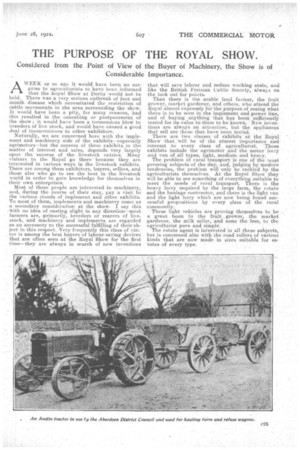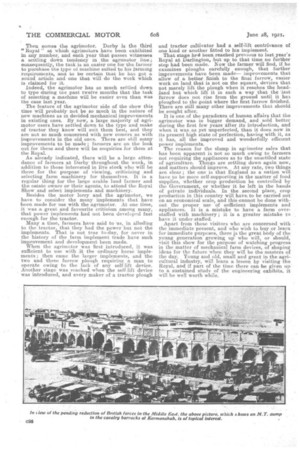THE PURPOSE OF THE ROYAL SHOW.
Page 9

Page 10

If you've noticed an error in this article please click here to report it so we can fix it.
Considered from the Point of View of the Buyer of Machinery, the Show is o Considerable Importance.
AWEEK or so ago it would have been no surprise to agriculturists to have been informed that the Itoyal Show at Derby would not he held. There was a very serious outbreak of -foot and mouth disease which necessitated the restriction of cattle movemeets in the area surrounding the show. It would have been a pity, for many reasons, had this resulted in the cancelling or postponement of the show ; it would have been a tremendous blow to breeders of live stock, and would have caused a good deal of inconvenience to other exhibitors.
Naturally, we are concerned here with the implement and machinery side of the exhibits—especially agrimotors—but the success of these exhibits in the matter of interest and sales, depends very largely upon the sheeess of the livestock entries. Many visitors to the Royal go there because they are interested in various ways in the livestock exhibits. There are among them exhibitors, buyers, sellers, and those also who go to see the best in-the livestock world in order to gain knowledge for themselves in their own enterprises. .
Most of these people are interested in machinery, and, during the course of their stay, pay a visit to the various stands of implement and other exhibits. To most of them, implementsand machinery come as a secondary consideration at the show. I say this , aith no idea of casting slight in any direction—most farmers are, primarily, breeders or rearers of livestock, and machinery and implements are regarded as an accessory to the successful fulfilling of their object in this respect. Very frequently this class of visitor is among the best buyers of labour-saving devices . that are often seen at the Royal Show for the first time—they are always in search of new inventions
that will save labour and reduce working costs, and like the British Freisian Cattle Society, alwaj.s on the look oat. for points.
Then there is the arable land farmer, the fruit grower, market gardener, and others, who attend the _Royal almost expressly for the purpose of seeing what there is to be seen in the implement and power line, and of buying anything that has been sufficientlY tested for its value to them to be known. New inventions are always an attraction, but the appliances that sell are those that have been tested. .
There are two classes of exhibits at the Royal Show that will be of the utmost iinportan'ce and interest to every .class of agriculturist. 'These exhibits include the agrimotOr and themotor' lorry and van of all types, light, .medium and heavy. • The problem of rural transport is' one of the most pressing subjects of the day, and, judging by-moderri tendencies, the problem will only be tackled by the agriculturists themselves. At the Royal Show they will be able to see something of everything suitable to meet the needs of rural transport. There is the heavy lorry required by the large farm, the estate and the haulage contractor, and there is the light van and the light lorry which are now being found successful; propositions by every class of the rural community. • These light vehicles are proving themselves to be a 'great boon to the fruit grower, the market gardener, the milk seller, and note the less, to the agriculturist pure and simple. The estate agent is interested in all these subjects, hut is concerned also with the road rollers of various kinds that are now made in sizes suitable for estates of every type. Then comes the agrimotor. Derby is the third " Royal "at which agrimotors have been exhibited in any number, and each year that passes witnesses a settling dawn tendency in the agrimotor line; consequently, the task is an easier one for the farmer to purchase the type °I machine suited to his farming requirements, and to bo certain that he has got a sound article and -one that will do the work which is claimed for it.
Indeed,' the agrimotor has so much settled down to type during tne past twelve months that the task of selecting a machine will be easier even than was the ease last year.
The feature of the agrimotor side of the show this time will probably not be so much in the nature of new machines as in decided mechanical improvements in existing ones. By now, a large majority of agrimotor users have settled down to the type and make of tractor they know will suit them best, and they are not so much concerned with new corners as with improvements in the old ones. There are still many improvements to be made; farmers are on the look out for these and there will be enquiries for them at the Royal.
As already indicated, there will be a large attendance of farmers at Derby throughout the week, in addition to those interested in live stock who will be there for the purpose of viewing, criticizing and selecting farm machinery for themselves. It is a regular thing for the large arable land farmer and the estate owner or their agents, to attend the Royal Show and select implements and maohinery.
Besides the motor lorry and the agrimotor, we have to consider the many implements that have been made for use with the agrimotor. At one time, it was a great and favourite criticism among many, that power implements had not been developed fast enough for the tractor.
Many a time, farmers have said to us, in alluding to the tractor, that they had the power but not the implements. hat is not true to-day, for never in the history of the farm implement trade have such improvement and development been made.
When the agrimotor was first introduced, it was sufficient to use with it the ordinary horse implements ; then came the larger implements, and the two and three furrow plough requiring a man to operate owing to the lack of any self-lift device. Another stage was reached when the self-lift device was introduced, and every maker of a tractor plough
and tractor cultivator had a sell-lift contrivance of one kind or another fitted to his implement.
That stage had been reached previuus to last year's Royal at Darlington, but up to that time no further step had been made. Now the farmer will find, if he examines ploughs carefully enough, that further improvements have been made— improvements that allow of a better finish to the final furrow, easier work on land that is not on the square, devices that not merely lift the plough when it reaches the headland but which lift it an such a, way that the 'last furrow does not rise from the ground until it has ploughed to the point where the first furrow finished. There are still many other improvements that should be sought after. It is one,of the paradoxes of human affairs that the agrimotor was in bigger demand, and sold better during the first few years ifter its introduction, and i
when t was as yet unperfected, than it does now in its present high state of perfection, having with it, as it has, all the improved and wonderfully efficient power implements.
The reason for the slump in agrinaotor sales that has been apparent is not so much owing to farmers not requiring the appliances as to the unsettled state of agriculture. Things are settling down again now, and matters should improve. At any rate, two things are clear ; the one is that England as a nation will have to be more self-supporting in the matter of food supplies, whether crop production be controlled by the Government, or whether it be left in the hands of private individuals. In the .second place, crop production in this country will haveto be carried out on an economical scale, and this•cannot be done without the proper use of sufficient implements and appliances. It is a mistake to have a farm overstaffed with machinery ; it is a greater mistake to have it under-staffed.
Apart from those visitors who are concerned with • the immediate present, and who wish to buy or learn for immediate purposes, there .0 the great body of the young generation growing up who will, or should, visit this show for the purpose of watching progress in the matter of mechanical farm devices, of shaping ideas for the future 'when they will be the masters of the day. Young and old, small and great in the agricultural industry, will learn a lesson by visiting the Royal, and if part of the time there can be gi-ven up. to a sustained study of the engineering exhibits, it will be well worth while.








































